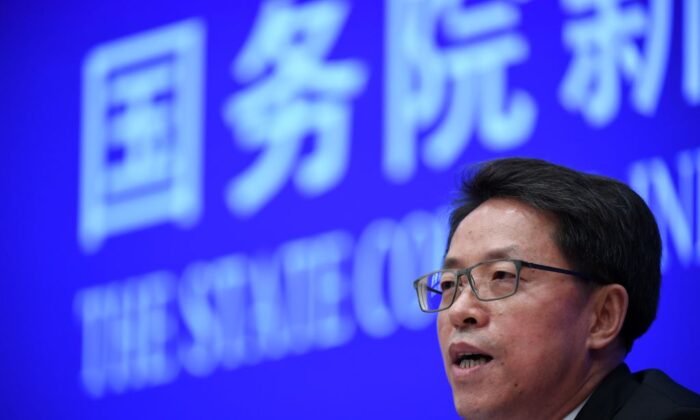Beijing on July 1 defended its controversial national security law for Hong Kong and slammed the United States for its potential sanctions against Chinese officials.
Zhang Xiaoming, deputy director of the Hong Kong and Macau Affairs Office—Beijing’s top agency for handling those territories’ policies—said at a press conference that countries that wanted to sanction Chinese officials were thinking in “the logic of robbers.”
He added that the law was China’s “internal affairs” and said it was “none of the businesses” of these countries.
The U.S. Statement Department announced last week that it will impose visa restrictions on Chinese Communist Party (CCP) officials involved in eroding Hong Kong’s autonomy and freedoms. State Department Spokesperson Morgan Ortagus said on Twitter that the visa restrictions will also target CCP officials behind the national security law.
The national security law went into effect on June 30 after ceremonial votes by China’s rubber-stamp legislature, the National People’s Congress (NPC). The law criminalizes individuals for any acts of subversion, secession, terrorism, and collusion with foreign forces, with maximum penalties of life imprisonment.
Zhang said that Beijing had announced its own visas restrictions on U.S. individuals who have acted maliciously on issues related to Hong Kong.
In his remarks, Zhang cited recent announcements by U.S. Secretary of State Mike Pompeo and Secretary of Commerce Wilbur Ross on revoking Hong Kong’s special trading status and stopping its defense equipment exports to Hong Kong, as well as imposing similar export restrictions on Hong Kong as it does on China on U.S. defense and dual-use technologies.
 US Secretary of State Mike Pompeo holds a joint news conference on the International Criminal Court at the State Department in Washington on June 11, 2020. (Yuri Gripas/AFP via Getty Images)
US Secretary of State Mike Pompeo holds a joint news conference on the International Criminal Court at the State Department in Washington on June 11, 2020. (Yuri Gripas/AFP via Getty Images)On June 29, Pompeo announced on Twitter that the United States “will not be deterred from taking action to respond” to the CCP’s threats to restrict visas for U.S. citizens, characterising the CCP’s move as a “refusal to accept responsibility for breaking its commitment to the people of Hong Kong.”
Zhang said on July 1 that if the U.S. government “makes a move,” Beijing and the Hong Kong government will “surely retaliate.”
He also hit back at suggestions that China was replacing “one country, two systems”—a framework by which Beijing promised to preserve Hong Kong’s autonomy upon the city’s transfer of sovereignty from Britain to China in 1997—with “one country, one system.”
If that was Beijing’s intention, Zhang argued that Beijing could simply impose Chinese laws, including the criminal law, on Hong Kong. He elaborated the law was to guide “one country, two systems” more in the direction of “one country.”
Shen Chunyao, head of the Legislative Affairs Commission of the NPC Standing Committee, who was also at the press conference, claimed that that the new law had “widespread support among all of the Chinese citizens including people in Hong Kong,” and the law “reflected their wills.”
A poll by local newspaper Ming Pao conducted in early June showed that 64 percent were against Beijing’s decision to bypass Hong Kong’s legislature to propose a national security law in the Chinese-ruled city.
 Members of the pan-democracy camp hold a press conference in Hong Kong on July 1, 2020. (Song Bilung/The Epoch Times)
Members of the pan-democracy camp hold a press conference in Hong Kong on July 1, 2020. (Song Bilung/The Epoch Times)The pro-democracy camp in Hong Kong also held a press conference on Wednesday morning, where lawmaker Claudia Mo said that press freedom could be pronounced “dead” after new supervision measures against media organizations under the national security law.
A provision in the national security stipulates that the Hong Kong government will take “necessary measures to strengthen public communication, guidance, supervision and regulation over matters concerning security, including those relating to schools, social organisations, the media and the internet.”
Anita Yip, vice chairwoman of Hong Kong Bar Association, raised concerns on Wednesday about a lack of clear definition of the four offenses under the law—secession, subversion, terrorism, and collusion with foreign forces—local media RTHK reported.
“We all understand the reason why there is concern is really that we all know national security is defined in a very flexible, in a very wide fashion in China, and the understanding of national security in China and Hong Kong has always been different because of the two systems,” Yip said.
“So we have reasons to believe that it may be subject to an unacceptably wide power of interpretation,” she added.
Focus News: Beijing Threatens to Retaliate Against the US, A Day After National Security Law Goes Into Effect
